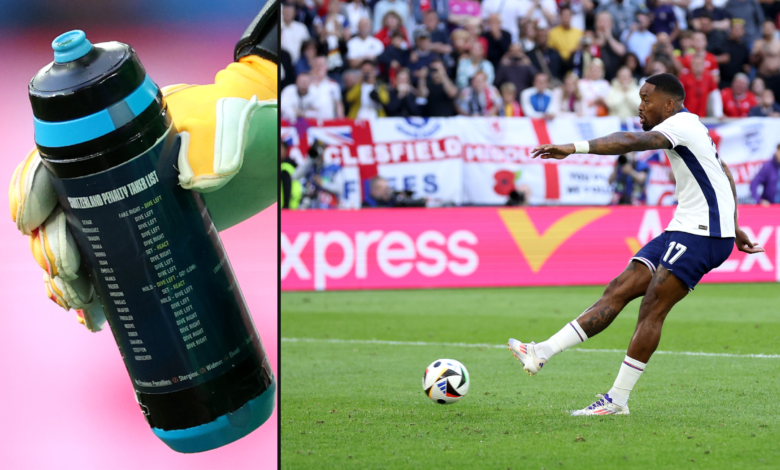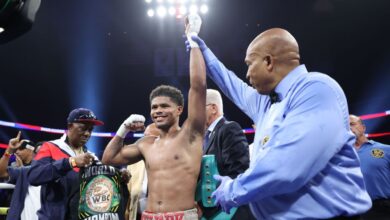England penalties vs Switzerland analysed: Buddy system, Pickford bottle, crucial pauses

[ad_1]
Watching England’s penalties in their shootout victory over Switzerland in the Euro 2024 quarter-final, it would be tempting to think: why do people always make penalties look so hard?
Because the five penalties — by Cole Palmer, Jude Bellingham, Bukayo Saka, Ivan Toney and Trent Alexander-Arnold — England took were so good it all looked very easy indeed.
[VOTE: Which was your favourite England penalty?]
But, of course, it wasn’t — as generations of England players and fans will tell you. This was a long way from the failures of the past: this was a team that knew what they were doing, who had planned it all meticulously. It was the successful conclusion to a process that England have had in place for most of Gareth Southgate’s tenure but has been refined over the years.
“This is a rehearsed, polished routine,” Geir Jordet, author of the book Pressure: Lessons from the Psychology of the Penalty Shootout, tells The Athletic. “It’s screaming that they have everything planned, it’s all deliberate. It’s as close to machine-like penalty-taking as you can get as a team.”
It all started before a kick was taken.
While Switzerland head coach Murat Yakin delivered his pre-shootout address to the whole Swiss squad, it was notable that Southgate gathered only the players who were on the pitch at the end of extra time. All the substitutes and those who had been substituted — even captain and usual penalty-taker Harry Kane — were on the touchline. No distractions, nothing superfluous.

(Nick Potts/PA Images via Getty Images)
Southgate also made a point of speaking to a few players who didn’t take a penalty — Declan Rice, Luke Shaw, Kyle Walker and John Stones — the reason for which would become clear.
It seemed as if England adopted a sort of ‘buddy system’, where one player would be assigned to one of the takers to support them and congratulate them after they had taken their kick — Walker with Palmer, Shaw with Bellingham, Stones with Saka, Rice with Ivan Toney. Alexander-Arnold presumably had an assigned buddy, but that all got lost in the bundle of everyone celebrating. Their job would have been to commiserate if any of them had missed but, in the end, there was no need.
“They’ve invented a way to approach this individual event as a collective, team event,” says Jordet. “They have a structure for preventing the players from going at this alone. A support structure takes down the pressure just a little bit.”
It’s notable England didn’t do this in 2021, when they lost the final of the last European Championship on penalties to Italy — something that Jordet criticised in his book. “It’s very cool that they learn. That they adapt and they get better,” he says.
4 – Jordan Pickford has saved four of the 14 penalties he has faced in shootouts at major tournaments, twice as many as all other England goalkeepers combined saved between 1990 and 2012 (2 out of 36). Hero. pic.twitter.com/vspFL4aZLG
— OptaJoe (@OptaJoe) July 6, 2024
It was a significant help that England went ahead. Palmer slotted his away, Switzerland goalkeeper Yann Sommer dived the wrong way, and then Jordan Pickford saved his fourth penalty in three major tournament shootouts, adding Manuel Akanji to Carlos Bacca, Andrea Belotti and Jorginho.
It was partly because it was a bad penalty, Akanji hitting his kick with little power, low but not far enough to Pickford’s left. But it was also partly thanks to Pickford’s delaying tactics. As you can see here…

… Akanji is almost in place, while Pickford has turned around and walked away from the goal, to pick up his water bottle that he conveniently left about 20 yards away.

Akanji has already placed the ball on the spot and stepped back to the top of his run-up by the time Pickford eventually gets there, something Jordet believes was a big mistake.
“When players stand in that position for eight seconds or more, their success rate drops to below 50 per cent,” he says.
“Akanji was by far the player who stood in that position for the longest — it was 14 seconds. He made the mistake of putting the ball on the spot and then immediately walking back. You’re left in that waiting position for such a long time. What you see a lot of players doing — Saka, Erling Haaland, Martin Odegaard (in the Premier League) — is to put the ball on the spot, but only walk back when the referee is ready.
“If you’re standing by the spot with the ball, you can do things, adjust the ball, you can still keep yourself busy. But standing there and waiting is a long time to still be focused.”

Pickford delayed things even further by walking to the edge of the six-yard box to talk to the referee, all the while with Akanji standing there and waiting.

Ultimately, referee Daniele Orsato put a stop to Pickford’s tactics: the image above is from before Switzerland’s fourth penalty, scored by Zeki Amdouni (above).
“He was just going to boot me if I wasn’t going back to the line,” said Pickford afterwards. “I had to play the game a little bit.”

The England goalkeeper had to rely on more basic distraction tactics, like the old ‘pull a funny face’ gambit. The image above is how he tried to put Fabian Schar off — unsuccessfully, in the end.
Pickford also had detailed notes on his water bottle, telling him how to approach each Swiss taker and which way to dive.
This is not a new technique, it’s something that goalkeepers have been doing in some fashion for years: you may remember Jens Lehmann having a piece of paper tucked into his sock for Germany’s shootout against Argentina at the 2006 World Cup. You may also remember Australia goalkeeper Andrew Redmayne hurling his opposite number Pedro Gallese’s annotated water bottle into the crowd during the shootout in the 2022 World Cup qualifying play-off against Peru.

(Carl Recine/Getty Images)
It’s also something Sommer may have done, too: his bottle was judiciously covered with a towel for the whole shootout, so unless he had a latte in there that he was trying to keep warm, he probably had a similar guide.
What’s interesting is Pickford didn’t quite follow the instructions on the bottle. He did for three of Switzerland’s four penalties, including the one he saved from Akanji, but his instructions for Schar were to ‘fake right, dive left’, but he actually faked left and dived right. Schar did put his kick to Pickford’s left, so it could have been even better for England.

Whatever the instructions, Pickford gave England a huge advantage: the psychological benefit of going ahead so early is clear. “The save at the start of the shootout gives you confidence,” said Alexander-Arnold after the game.
Bellingham went next, with a deliberate approach, a stutter step, and then waited for Sommer to dive right and put the ball into the opposite corner. He then stared down the Swiss keeper — not necessarily something specific to the penalty routine, but the sort of alpha move we have become used to from Bellingham.
Schar scored for Switzerland, then Saka stepped up. This was one that nobody of an England persuasion wanted to see him miss after he did so three years ago against Italy. The Arsenal forward seemed to thrive on the pressure, though, putting his kick right into the corner to the keeper’s left.
“It’s something I embrace,” he said after the game. “You can fail once and you have a choice over whether you put yourself in that position again. I’m a guy who’s going to put myself in that position. I believed in myself.”
It was reminiscent of Stuart Pearce scoring against Spain at Euro ’96, six years after he missed in the 1990 World Cup semi-final against West Germany. Saka didn’t quite let out the sort of primal, manic scream Pearce did, but he did break out into a massive smile, which was rather more fitting for him.
“It resonated with his personality,” says Jordet. “He couldn’t have screamed like Pearce, but his smile was equally full of energy.”
Sure we beat Spain in 1996? Psycho Stuart Pearce scoring. Dave Seaman saved 1 or 2?! 🦁 🦁 🦁 https://t.co/3elznqEX8G
— Justin Jarrett (@justinjarrett27) July 6, 2024
Xherdan Shaqiri scored a virtually unsavable kick, then it was Toney. His technique, staring at the goalkeeper the whole time and not looking directly at the ball even as he kicks it, is extraordinary if not unique; Poland’s Robert Lewandowski does something similar.
“It’s probably slightly inaccurate to say they don’t look at the ball,” says Jordet. “They use their peripheral vision. Their central vision, the one they need to pick up detail, is on the goalkeeper. You need to have such a clear head to execute a technique like that.”
Sommer didn’t need a well-researched list to know what was coming: he stood as still as he could for as long as he could, but Toney is so good that even when keepers don’t dive early, he can put his penalty right into the bottom corner, as he did here.
“Considering it’s my routine, I just think it’s what I do,” said Toney. “Some people might see it as crazy, but that’s just my routine, and I stick to it, and it’s been working, so hopefully it can work when whenever it’s needed.”
Amdouni converted his kick, so it was down to Alexander-Arnold to seal it. Which he did emphatically, lashing his effort high and into the top corner. Sommer dived the wrong way, but it would have taken a hell of a save to stop it even if he had guessed right.
“When the gaffer tells me I’m taking one, my belly didn’t drop,” Alexander-Arnold said. “A lot of practice went into that moment. I enjoy it. I knew the spot, I just needed to execute it.”
If there was one common thread linking England’s penalties, which perhaps differed from Switzerland’s, it was time.

(Jonathan Moscrop/Getty Images)
“How long players take from the whistle to starting their run is often an indication of how deliberately have they planned things,” says Jordet. “The English players on average took 5.2 seconds — the Swiss players took 1.3 seconds.”
It’s easy to say this after a shootout England have won, but this suggests one team were in control and took their time, while the other was a little rushed. It’s not the time itself that is important, more what it means, as Jordet explains.
“Time in itself has no value. That’s a worthless metric in itself. It’s all about what it represents: why do you do it? If you stand for five seconds just because the coach has told you to, it has no positive impact. But if you stand for five seconds to have more control over yourself in that moment, to take the time to have two or three deep breaths that will send constructive hormones throughout your body and mind, with that time you take more control over the situation because you dictate when you take the kick. You make the goalkeeper stand there in a 100 per cent focused condition, waiting for you. You grab control over the moment.”
And so, England are in their third semi-final in four tournaments under Southgate. And while there can be many justifiable complaints about how his team has played during the games at Euro 2024, what’s undeniable is he has revolutionised the way England approach penalty shootouts.
“We think we’ve got a good process,” said Southgate after the game. “We’ve been in four, we’ve won three. We got absolutely crucified for the one we lost. We refined that process a little bit. We have more regular penalty-takers in the squad than we had in 2021 and more that have been in shootouts.”
5/5 – England scored all five of their penalties against Switzerland, just the second time in 10 major tournament shootouts that England have scored 100% of their penalties, also doing so at EURO 96 vs Spain (4/4). Nerve. pic.twitter.com/vAkDL5U7NZ
— OptaJoe (@OptaJoe) July 6, 2024
He’s not kidding. In senior football for club and country, Palmer (12 from 12), Bellingham (five from five) and Alexander-Arnold (four from four) all have 100 per cent penalty conversion rates. Saka’s is 87.5 per cent (14 from 16) and Toney’s is 92.7 per cent (38 from 41). For context, the average conversion rate usually hovers around the 75 per cent mark.
England are very protective of their process. You’ll notice Southgate spoke about it in generalities but offered no specifics. When a journalist tried to ask Pickford about how he prepares an England press officer interrupted, keen that no significant secrets were divulged.
The reasons for that are fairly obvious: they don’t want to give any of their upcoming opponents any hints at all.
“Now they have been out there and they have shown what they can do,” says Jordet, “this, of course, gives their opponents a way to prepare more accurately, with a little bit more information. Having a big win like this will reinforce everything they’ve done and give them a big chunk of confidence; their style and structure is now out there.”
For now, England won’t worry too much about that. And if there is to be another penalty shootout on for them in Germany… well, they won’t worry too much about that either.
(Additional contributor: Jack Pitt-Brooke)
(Photos: Getty Images)
[ad_2]
Source link




